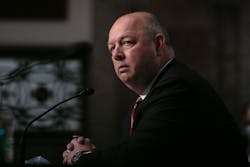WASHINGTON — Steve Dickson, who led the U.S. Federal Aviation Administration through a tumultuous period following fatal crashes of Boeing Co.’s 737 Max and the COVID-19 pandemic, is stepping down from the agency at the end of March.
Dickson informed FAA’s employees in an email Wednesday of his plan to depart less than three years into his five-year term. He called the decision “very difficult” but said he was motivated by the long periods he’d been forced to spend away from his family in Georgia as a result of the job and the pandemic.
“Although my heart is heavy, I am tremendously proud of everything we have accomplished together over the past several years,” Dickson said in the email, reviewed by Bloomberg News. “The agency is in a better place than it was two years ago, and we are positioned for great success.”
Dickson, 64, was appointed head of the FAA by President Donald Trump and sworn in on Aug. 12, 2019. That was about five months after the second of two crashes of the 737 Max, which killed 346 people. Dickson was thrust front and center as Congress held contentious hearings into the agency and its role in certifying the jet.
“We are grateful for his years of service to our country and his lifelong dedication to making sure our aviation system is the best and safest in the world,” Transportation Secretary Pete Buttigieg said in a statement.
Only months after taking the job, Dickson personally chastised Boeing’s then-Chief Executive Officer Dennis Muilenburg and other top company officials, a dramatic change of course for an agency accustomed to a close relationship with Boeing. Muilenburg was soon out of a job and the company’s relationship with the FAA changed dramatically.
Boeing’s revisions of the 737 was more extensive and took many more months than it originally planned. Agency safety workers took over more inspections of the plane and the FAA issued several enforcement actions against the planemaker.
Crises seemed to trail Dickson into the job. When the coronavirus erupted in early 2020, consumer travel plunged, forcing the FAA to adapt its safety oversight as the industry lost as much as 96% of its customers and mothballed jets by the thousands. FAA air-traffic controllers and other employees had to invent protocols on the fly to deal with COVID-19 infections.
He faced another challenge late last year as AT&T Inc. and Verizon Communications Inc. prepared to activate new 5G wireless phone services on frequencies near those used by jetliner altimeters. Dickson’s FAA was pitted against the Federal Communications Commission and the companies, which originally said the service posed no hazard.
The FAA said the new radio signals posed a risk of interference and had to broker a series of compromises to restrict the placement of 5G cell towers near airport runways to prevent widespread flight disruptions. The service was activated on Jan. 19 and has gradually been expanded as FAA conducts flight tests to determine the extent of any possible interference.
Dickson attended the Air Force Academy and was a fighter pilot before flying for Delta Air Lines Inc. He rose to be senior vice president-flight operations for Delta, retiring from the airline.
___
©2022 Bloomberg L.P. Visit bloomberg.com. Distributed by Tribune Content Agency, LLC.





